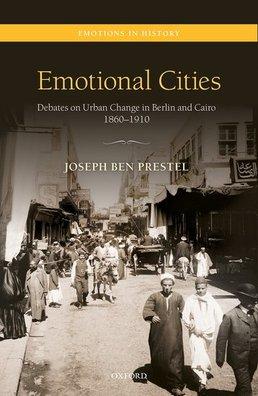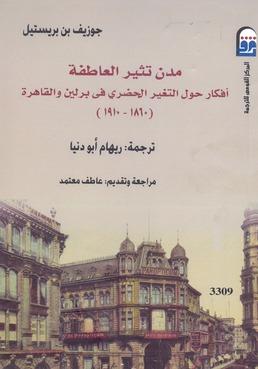Dr. Joseph Ben Prestel

Freie Universität Berlin
Research Associate and Lecturer (Wissenschaftlicher Mitarbeiter), on leave between February 2025 and January 2027
European History, Middle Eastern History, Urban History
Neuere Geschichte/Global History
Koserstraße 20
Raum A 360
14195 Berlin
Sprechstunde
Please sign up for office hours here.
Joseph Ben Prestel is Assistant Professor (wissenschaftlicher Mitarbeiter) of History at Freie Universität Berlin. He received his PhD from the same institution in April 2015. Before joining Freie Universität’s history department, he held a position at the Center for the History of Emotions within Berlin’s Max Planck Institute for Human Development. He has received fellowships from the Max Planck Society, the American University in Cairo, the University of Cambridge, and the Orient Institut Beirut. During the academic year 2018-19, he was a Fung Global Fellow at Princeton University.
Joseph’s research and teaching focus on modern global and urban history with an emphasis on the entangled history of Europe and the Middle East. His first book Emotional Cities: Debates on Urban Change in Berlin and Cairo, 1860-1910 (Oxford UP, 2017) examines the parallel rise of arguments about specifically urban emotions in Berlin and Cairo during the second half of the nineteenth century. The book is the co-winner of the Urban History Assocation's Best Book in Non-North American History Award, 2017-18. An Arabic translation was published, in 2023. Joseph’s current research project analyzes the rise and fall of a solidarity movement with Palestinians in West Germany, between the 1950s and the 1980s. He is a co-founder of the Global Urban History Project and a co-editor of the new Cambridge Elements in Global Urban History. His work has also appeared in publications like Frankfurter Allgemeine Zeitung, Merkur, and Berlin Review.
Winter Semester 2022/23
Theorie, Methodik und Geschichte der Geschichtswissenschaft
Theorie, Methodik und Geschichte der Geschichtswissenschaft
Summer Semester 2022
A Global History of Leftist Disenchantment in the 1970s and 1980s
Winter Semester 2021/22
Introduction to Historical Research and Writing
Winter Semester 2020/21
Summer Semester 2020
Introduction to Historical Research and Writing
Migrationsgeschichte der Bundesrepublik und der DDR (1945-1989)
Winter Semester 2019/20
From Nasser to Mao: A Global History of Third Worldism
Globalgeschichte und Intellectual History
Summer Semester 2018
The Global Cold War in the Middle East
Migrationsgeschichte der Bundesrepublik Deutschland, 1949-1990
Winter Semester 2016/17
Introduction to History as a Discipline
The Global History of Development in the Twentieth Century
Theorie, Methodik und Geschichte der Geschichtswissenschaft
Summer Semester 2016
Global Histories of Technology in the Nineteenth Century
Westeuropa und die arabische Welt nach 1945
Winter Semester 2015/16
Gender in the Age of Empire, 1850-1950
Theorie, Methodik und Geschichte der Geschichtswissenschaft
Theorie, Methodik und Geschichte der Geschichtswissenschaft
Summer Semester 2015
Approaches to the Global History of Development in the Twentieth Century
The Palestinian cause occupies a prominent place in the history of West Germany. Following the Six Day War, a new, radical left formed in the country, which adopted an increasingly anti‑Zionist stance. During the 1970s, armed groups like the Red Army Faction developed close ties to Palestinian organizations, such as the Popular Front for the Liberation of Palestine (PFLP). Palestine Solidarity Committees mushroomed at West German universities and the kufiya, dubbed the “Palestinian scarf,” became a popular fashion accessory in the radical left.
This project draws on Arabic sources to provide a new vista on the solidarity movement with Palestinians in West Germany. Based on oral history interviews and archival research in Lebanon and Germany, it asks how our understanding of the solidarity movement’s past changes, once we take a Palestinian perspective into account. The project answers this question by examining an untold story of the solidarity movement that starts in the late 1950s, reveals the import of migration for the circulation of political ideas, places West Germany in a global context, and demonstrates how dynamics in settings like Beirut and Amman shaped the country’s new, radical left.

Emotional Cities: Debates on Urban Change in Berlin and Cairo, 1860-1910. Oxford: Oxford University Press, 2017
Co-winner of the Urban History Assocation's Best Book in Non-North American History Award, 2017-18.
Reviews: The American Historical Review; Journal of Modern History; German History; la vie des idées (English version: books & ideas); Journal of Urban History; Urban History; H-Net; Review of Middle East Studies; Storica. Rivista Quadrimestrale; Emotions: History, Culture, Society; Journal of Ottoman Studies; Cromohs. Cyber Review of Modern Historiography; al-'Arabi al-Jadid; almayadeen.net

Arabic translation: Mudun tathir al-'adifa: Afkar hawla al-taghayur al-hadari fi birlin wa al-qahira. Cairo: Al-markaz al-qawmi lil-tarjama, 2023. Translated by Riham Abu Dunia with a comment by Atef Moatamed
Reviews: al-Masry al-Youm, al-Quds al-Arabi, Independent Arabia, 7ayez.com, al-Salon
2022
“A Diaspora Moment: Writing Global History Through Palestinian-West German Ties.” The American Historical Review 127.3: 1190–1221.
2021
“Corresponding Knowledge: Arguments about Emotions and Entertainment in Berlin and Cairo around 1900.” In Threatened Knowledge: Practices of Knowing and Ignoring from the Middle Ages to the Twentieth Century, edited by Renate Dürr, 232-48. London: Routledge.
2020
“Cairo.” In Oxford Bibliographies in Urban Studies, edited by Richard Dilworth. New York: Oxford University Press.
"Epilogue: What Do Histories of Migration Tell Us About Port Cities?" In Migrants and the Making of the Urban-Maritime World Agency and Mobility in Port Cities, c. 1570–1940, edited by Christina Reimann and Martin Öhman, 267-282. Oxon and New York: Routledge.
"Comparative Emotions." In Sources for the History of Emotions: A Guide, edited by Katie Barclay, Sharon Crozier-De Rosa, and Peter N. Stearns, 172-181. Oxon and New York: Routledge.
2019
"Heidelberg, Beirut und die »Dritte Welt«: Palästinensische Gruppen in der Bundesrepublik Deutschland (1956-1972)." Zeithistorische Forschungen/Studies in Contemporary History 16.3: 442-466.
"Anthropologists: Feelings in the Field." In Encounters with Emotion: Negotiating Cultural Difference Since Early Modernity, edited by Benno Gammerl, Philipp Nielsen, and Margrit Pernau, 85-109. New York: Berghahn. (together with Pascal Eitler)
2016
“Body Polis - Körpergeschichte und Stadtgeschichte.” Body Politics: Zeitschrift für Körpergeschichte 4: 5-20. (together with Pascal Eitler)
2015
“Gefühle in der Friedrichstraße: Eine emotionshistorische Perspektive auf die Produktion eines Stadtraums.” sub\urban: Zeitschrift für kritische Stadtforschung 3: 23-42.
“Hierarchies of Happiness: Railway Infrastructure and Suburban Subject Formation in Berlin and Cairo around 1900.” City: Analysis of Urban Trends, Culture, Theory, Policy, Action 19: 322-331.
2013
“Die Reform der Stadtmänner: Urbaner Wandel und Körperpolitik in Kairo am Ende des 19. Jahrhunderts.” Body Politics: Zeitschrift für Körpergeschichte 1: 323-346.
Contributions in the Media:2025
“Der Stoff, aus dem Legenden sind.” Frankfurter Allgemeine Zeitung. August 6, 2025.
2024
“Geboren in «Jaffa, Jordanien».” Berlin Review 1 (2024).
2022
“Für revolutionäre Gewalt, gegen Rassismus.” Frankfurter Allgemeine Zeitung. September 6, 2022.
“Politische Gewalt zwischen München und Beirut. Palästinenser und die radikale Linke in Westdeutschland, 1970–1982.” Deutschlandfunk Nova. January 14, 2022 [talk broadcasted on German national radio].
2019
“Palästina-Solidarität. Bruchstelle einer globalen Linken.” Merkur 839: 61-67.
Other publications:2023
Book review of German Angst: Fear and Democracy in the Federal Republic of Germany by Frank Biess. The American Historical Review 128.1: 418-419.
2021
Book review of Israelpolitik: German-Israeli Relations, 1949–69 by Lorena De Vita. H-Soz-Kult, May 19, 2021.
Book review of Tabu, Trauma und Identität: Subjektkonstruktionen von PalästinenserInnen in Deutschland und der Schweiz, 1960–2015 by Sarah El Bulbeisi. H-Soz-Kult, March 1, 2021.
2020
Book review of In Quest of Justice: Islamic Law and Forensic Medicine in Modern Egypt by Khaled Fahmy. The American Historical Review 125: 1118-1119.
Book review of West Germany and Israel. Foreign Relations, Domestic Politics, and the Cold War, 1965–1974 by Carole Fink. H-Soz-Kult, February 2.
2019
Book review of Zeitenwende 1979: Als die Welt von heute begann by Frank Bösch. German History 37: 456-458.
2018
“When Threads Wear Thin: The West German Radical Left and Palestinian Groups at the End of the 1970s.” Trafo: Blog for Transregional Research, August 8.
2017
Book review of Islam and the European Empires edited by David Motadel. H-Soz-Kult, March 2.
2016
Book review of Writing History in the Global Era by Lynn Hunt and Deutsche Zeitgeschichte – transnational edited by Alexander Gallus, Axel Schildt, and Detlef Siegfried. Sehepunkte: Rezensionsjournal für die Geschichtswissenschaft 16.
“Paris Everywhere? The Challenge of Eurocentrism in Global Urban History.” Global Urban History Blog, April 5.
2014
Book review of Individuality and Modernity in Berlin: Self and Society from Weimar to the Wall by Moritz Föllmer. German Historical Institute London Bulletin 37: 100-104.
2013
“Muhammad Ali Street and the Shifting Symbolism of Cairo’s Cityscape.” Cairobserver, February 5.



